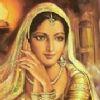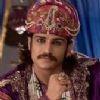Folks,
I was in two minds as to how to tackle these 3 double episodes. It was rather like a triple decker sandwich: the first one had all the masala, the second had all the substance, and the third had all the show. Finally, I have decided to do them ad seriatim, and so here we go with Episode 34, the one of Thursday. (A small point: I have changed the numbering of the Wednesday episode from 33-34 to just 33, taking the one hour episode as just one, instead of two as earlier, so that the numbering of the later ones does not go out of sync.)
The opening montage of all these 3 episodes was tantalizing. Though Jodha is shown standing,with what might seem at first sight to be wifely subservience to her lord and master, seated and radiating imperial arrogance, a close look at her face shows a cool remoteness and self-possession. So the first time I saw it, I said to myself: Atta girl! Subsequently, I had reason to revise this flattering assessment, but of that more later.
Episode 34: Opening gambits
First things first. It was a peach of an episode. All the masala anyone could have wanted was there, blended as expertly as in a Khana Khazana show. There were all the navarasas of classical Indian theatre, and more: fear, trepidation, gnawing worry, arrogance, mischief, malice, shock, disillusionment, grief, courage, resignation, innocence, and even a tadka of comedy with the rotund halwai from Amer who is such an excellent advertisement for his wares!😉
Plus gorgeous sets and costumes. When Jalal and his entourage are coming in for the muhdikhayi, the overhead shots show richly covered walls gleaming in dull gold, setting off the lavish dresses of the principals. Especially Jodha's dream outfit, which is opulent and yet tasteful, a none too common combination!
Chess moves: It was also throughout like a game of chess, whence my title. At one time, as after the kangan bandhan, it was advantage Amer, but then, with his insistence on the muhdikhayi, it becomes advantage Jalal. Again, with the face-in-the-water gimmick, Amer gets ahead, but the wind plays spoilsport, and as Jodha's veil is blown off her head, Jalal smiles in unmistakeable satisfaction: this move was his.
The developments in this episode, the first of the 3 Shahi Shaadi ones, properly speaking, were all predictable in the broad sense, but it was the detailing that made them fascinating. The highlights, again in no particular order:
Jalal ka sar: Just when I thought that this stock phrase had become redundant, it proved to be a hardy perennial by reappearing in full strength! Jalal refers to it after his meeting with the three Ameri princes, looking rather bewildered at the sudden about turn in their fortunes as Jalal gravely tells his honewale rishtedaar: Ghabrayiye mat, and that they would be taken to Sambhar so that aap Mughal badshah ke nikaah me tahedil se maujood ho sakein.
Once they have been escorted out by the now totally subservient Sharifuddin, Jalal remarks, with a note of satisfied anticipation, Kal tak jo hamara sar kaatna chahte the, ab wo zindagi bhar hamare saamne sar jhukaye khade rahenge! As he was indulging in these fancies about Jodha's jhuka hua sar, I was in splits, thinking Some hope you have, young man! 😉
Jodha, on the other hand, in a state of happy ignorance about her bridegroom, was back in full form about Jalal and the Mughals. Having caught sight of a pair of Mughal soldiers outside her khema, she was sounding exactly as she had done 5 weeks ago, making me want to shake some sense into her. No wonder poor Bhagwan Das was on pins to get away!
This piece of tenacious folly apart, Paridhi was very convincing when projecting the blind panic that seizes Jodha at the very thought of Jalal . The eyes, the mouth, the whole face. all work in an agony of apprehension as she implores her brother to do something, anything, to prevent Jalal from sabotaging her marriage to the man who she believes will lay him low (and of course bring her that sar). Lovely stuff.
But for a Rajput princess, Jodha seems to have very little understanding of the ground realities of political and military power. Or of the real strength of the Mughals. If she did, she would not be dreaming of getting a husband who could defeat Jalal. Does she even wonder how this supposed veer could get her brothers freed by the Mughals? No, she does not. She sees nothing but what she wants to see.
The most charming vignette: The delightful encounter between Jalal and Mansingh. Jalal is greatly taken with the boy's innocence and his principled courage in his determination to defend Jodha, his buasa, and his parivaar. Also with the budding warrior that he sees in him, and in his naayab jungi taalim. And when he puts his sword to Jalal's neck, the latter remarks: Bahut khoob, kisi ki yaad dila do tumne! Jodha, of course. At that memory, Jalal's smile is inimitable.
I loved the way in which Mansingh, who does not hide his disapproval of the marriage, nonetheless shows due respect towards both the Shahenshah and the soon to be javaisa of Amer by backing out of his presence, as Jalal gravely does an aadaab. When Sharifuddin turns up immediately thereafter, full of questions which Jalal, characteristically, does not bother to answer, there is a strange faraway look in Jalal's eyes.
Is he perhaps ruminating about the uncomplicated courage and the simple but rigid code of honour that are the keys to the Rajput psyche? Fitting them into the idea that he had tossed to his ministers the other day after Bharmal had left - that the bravery and martial skills of the Rajputs should be co-pted to serve Mughal interests? Or is it plain and simple admiration, tinged with indulgence, towards one so very young and yet so fearless? Whatever it was, it is no wonder that in later years, Mansingh became Akbar's right hand man, the one who was constantly at the receiving end of Akbar's stentorian roars, Mansingh! Hukum ki taameel ho!
The Tilak ceremony: This was fascinating, and also a landmark scene for two reasons. The more important one: Jalal's acceptance of and his readiness to participate in a typical Rajput/Hindu ceremony, and this without the slightest hesitation, marks the beginning of a far-reaching process of cultural assimilation with the Rajputs, and then with the Hindus as a whole . It was this which, in parallel with political accommodation, was the bedrock of Akbar's inclusive Mughal empire. No wonder the fanatic Mahaam Anga winces in dismay, though by now, she knows better than to open her mouth! 😉
The second and more personal reason has to do with Myanavati, still haunted by the memory of Shakuni Bai's shrill pronouncements. Even the redoubtable Dadisa looks full of trepidation as someone explains to Jalal about the tilak ki rasam.
But what follows is a delicate sequence of, as Devki has put it elsewhere, non-verbal communication between Jalal and Mynavati. As Jalal leans forward and offers his forehead for the tilak, he smiles slightly. And for the first time ever, there is a fleeting, answering smile on her face. He smiles again, reassuringly this time. During the aarti, she looks to the side, but as she finishes it, she looks up at him, and her eyes meet his for the first time. They hold hers in a look of grave regard, which seems to soothe her fears, for she seems calmer as she turns away.
Also striking was the fleeting expression on Jalal's face when Bharmal, welcoming him, addresses him as Shahenshah (no more Agra ka Sultan!).
The Muhdikhayi: While Jalal's demand for this is a pure power play, part of his plan to teach Jodha a lesson, Amer turns up trumps on this one. The face in the water idea was brilliant diplomacy, for it preserved the sanctity of the kangan bandhan ritual, and yet met Jalal's demand as well. I would bet that it was the Dadisa, who had earlier thought of the kangan bandhan ploy, who was the one who came up with this as well, for it needed plenty of IQ, a commodity not plentiful among the Amer royal lot. 😉
Jalal's face, as he waits for Jodha to approach the water, is full of what the Germans would call Schadenfreude, the mischievous, indeed malicious delight in the discomfiture of another. He watches her like a cat at a mouse hole, and when she takes the reflection of his face, so much like the one she saw in the water during the Gangaur festival, to be a projection of her own fears and draws back, his wide smile shows puckish satisfaction. To make sure that she grasps the truth, he remarks audibly, Subhanallah! Badi fursaat se banaya hai Khuda ne tumhe!
As her panic mounts, her veil is displaced by a gust of wind, and she stares at him in agonized disbelief, the watchful, smiling stillness in his face is infuriating. When she turns eventually and bolts from the hall, he smiles again in pure triumph. He is not angry, nor does he feel humiliated, for this was exactly what he had wanted, and Jodha's reaction has exceeded his expectations.
Later, as he dismisses the vociferous complaints of Maham Anga with a Kasoor unka nahin tha, Badiammi! Humne suna hai ki Raja Bharmal ne unhein bataya hi nahin tha ki unka nikaah humse ho raha hai. Isliye unhein humein dekh kar itna gehra sadma laga, there is the same Cheshire cat grin on his face. And he adds, with visible satisfaction, Khair, sambhal jayengi!
Incidentally, Jalal seems to have a sound intelligence network; the Mughal spy who reports back to him about Dadisa's kangan bandhan ploy is as like a Rajput as could be.
Kanya paksh: It was very interesting, the kneejerk fears that take over Bharmal & Co at the very idea that Jalal might be upset at Jodha's abrupt departure from the muhdikhayi, and see it as an insult to him. And it is not just the timorous Bharmal, who gives a credible imitation of a cat on a hot tin roof. Bhagwan Das too, despite his initial, strong opposition to the marriage, is now on pins to avert any such calamity and to somehow placate the son-in-law to be.
Of course here, over above the traditional subservience of the kanya paksh (nowadays steadily becoming history, thank God!) there is also the fear of what an enraged Jalal might do to Amer. It was also striking how quickly the three newly liberated princes accept the idea of Jodha marrying Jalal, after just a token protest.
Maham Anga & Sharifuddin: She was trying desperately to get some sort of disapproving hold on the proceedings, and failing every time, especially with her complaint to Jalal about Jodha's bolting from he muhdikhayi. Left to herself, she would have vetoed the tilak and the aarti, not to speak of Jodha's radical sharts. But no one is going to ask her for her opinion, and when Jalal agrees to the Krishna mandir in Jodha's palace in Agra, it was as well that there was a chair in place, for her to collapse into from sheer shock 😉 .
Maham must be rueing the day she pushed Jalal to make his own decisions independently of his Khan Baba, for now he has started making them with a vengeance, and very undesirable ones from her point of view! No wonder she vents her frustrations by talking down to the hapless Bharmal when she brings Jalal's gifts for Jodha.
Sharifuddin, being no Adham Khan, but rather a true blue apparatchik (Russian for a bureaucrat) seems to have adjusted swiftly to the changed circumstances. He is seen busily ingratiating himself once again with the Shahenshah, by lauding his dedication to sword practice, among other things. It is revealing that he never dares to call his brother-in-law Jalal, as his foster brother Adham Khan does, but sticks to the respectful, even obsequious Shahenshah.
Jodha resurgent: By episode end, the desperate, tearful, shattered Jodha has picked herself up, aided no doubt by the blunt clarity of her mother's warning about the likely fate of Amer if she were now to jib at the marriage. Her face is a mask as she wipes her tears and looks up at her mother, who has just finished reminding her of the responsibilities and duties that fall to a royal's lot. The eyes are clear, full of a new determination to face whatever comes and master it, despite the cost to herself.
But this determination does not last, alas, and Jodha fails in the test that faces her next. That of her ability to avoid childish folly, and concentrate instead on ensuring that her personality remains intact even after marriage to the Mughal emperor. Something that would be in keeping with what she should be, brave and steadfast even in the worst adversity, and above all, as dignified as a princess has to be, no matter what.
On now to Episode 35.
Episode 35: Imperial flush
This episode - bookended between Jodha burning the shaadi ka joda on the one hand, and the shart scene on the other - belonged, beyond the shadow of a doubt, to Jalal the Emperor. By his unruffled and effortless domination of all around him, Rajputs or Mughals, Jalal shows that he is now truly the master, and not just in his own house. He is coolly decisive, making his moves with unerring skill and a firm grasp of the psychology of the opponent, unmoved to hasty anger, with his steely gaze always fixed on his ultimate goal, to rule over all of Hindustan.
And of course checkmating Jodha and putting her firmly in her place. Underneath every move of Jalal's today, , there is a smouldering, suppressed rage against Jodha for insulting him so blatantly, and that bodes ill for her life in Agra, even if she is able to cope with the very special istaqbal (reception) he is planning for her there.
By episode end, Jalal has won hands down over Jodha, and this with all the appearance of great magnanimity, patience, and consideration for her and for hers.
But what he really feels is in his eyes as he leaves the hall after accepting both her conditions; she alone sees it and despairs for her future.
Jalal's self-restraint: I am a good bit of a female chauvinist, and normally, in any such clash, I would always, instinctively, side with the woman. But not here.
Jodha let me down with a thud . She is not a tragic princess sacrificing herself on the altar of her duty, who puts her people above herself without question, as she claimed earlier that she would. Instead, she is irresponsible, self-centred, and exceedingly foolish in her total lack of understanding of the consequences of her folly for her father's subjects. Instead of seeking,and finding in herself the courage to face down any odds, she wails and whimpers and laments her fate.
The day before this one, one could have believed, and rejoiced, in the prospect of her rising above her shock and distress and making the best of the situation for the sake of Amer, while still seeking to preserve her individuality and her personal identity, religious and cultural. This following day, if tens of thousands of the dead and dying in Amer did not pay with the destruction of their lives for her self-centredness, if the terrible trio of Mahaam Anga, Adham Khan and Sharifuddin were not able to feast like vultures on the despoiled ruins of Amer, it was not thanks to Jodha.
It was rather because Jalal had the wisdom, and the self-restraint, not to let himself be stampeded into crushing Amer to salve his personal ego. Because he rates the reputation of his royal line, and his own as emperor, above such petty self-gratification. He is angry at Jodha, yes, even coldly furious, and he has every intention of paying her back. But he puts that in a separate compartment; he can look beyond that to see the broad picture, and his own place in history, and it is this that saves Amer.
It is not compassion or simple goodness of heart, not at all. Nor is it, as the romantics would undoubtedly interpret it, because he has fallen for Jodha without realizing it as yet, and he must have her at any cost, even of his pride. It is rather a calculated political move, a show of tolerance and accommodation extended to Bharmal and to Amer in the interest of the future of the Mughal dynasty in the Hindustan he seeks to unite under his aegis.
But let us take the developments from the beginning.
Sheh par mat nahin: Jodha is smarting under the barely veiled barbs of Maham Anga while she hands over the exquisite shaadi ka joda. This worsens as she looks at all the jewellery gifted to her by Jalal, and remembers the sacrilegious depredations of the Mughal soldiers at the Kali Mandir. Her face rigid with suppressed fury, she receives the joda, but immediately flings it at a lit pedestal lamp. It catches fire and goes up in flames, as Maham Anga screams dire warnings and the unfortunate Mynavati, after one look at the charred outfit and Jodha's rigid face, set in acute hostility, collapses nearby.
The heedless irresponsibility of what Jodha does, and this after her mother's grave warning just minutes earlier, shows her lack of both maturity and of the courage she talks about earlier, when she claims that she would be ready to sacrifice herself for Amer. When the time comes for her to walk the talk, she is found sadly wanting, for all she can do is to weep about her maan and sammaan, and voice her hatred of Jalal, with nary a thought for the fate of Amer. And what she does with the shaadi ka joda is something potentially so destructive for the Amer she professes to love about all else, that all one can do is throw up one's hands in despair.
The insult to the emperor is a very grave one, but Jalal does not let that, or Maham Anga's vociferous complaints, echoed by Adham Khan and Sharifuddin, stampede him into war against Amer. He understands, though they will not, that a bloody and destructive military campaign by the Mughals against Amer because of this failed marriage, will make the Rajputs martyrs and besmirch his own reputation for all time to come. He too seeks revenge on Jodha, but not at this juncture, nor in this manner.
Abhi Amer par hamla kar dete hain. Sab tabah kar dete hain.. Lekin uske baad kya? Uske baad kya hoga hum aapko batate hain. Amer jalega, par saath mein Jalal ki kafiyat (?) bhi raakh ho jayegi.. Amar ka har ek bashinda jalkar taariq mein amar ho jayega. Naam hog unka ki apni beti ki khatir unhone apne sar kata diye. Unke sar katkar bhi oonche ho jayenge Badiammi, Mughal parcham se bhi oonche.. Hum aisa nahin hone de sakte. ..
There is, in all this, a strange echo of his Khan Baba's advice to Jalal as to how best to handle the Rajput kaum.
And in reply to Maham's question as to whether this insult to the Mughals would go unanswered, Jalal responds with an icy calm that masks the fury raging within him: Jawab bhi diya jayega aut is beizzati ka badla bhi liya jayega. Par jung karke nahin, nikaah karke. .. Mughal apni poori shaan se unki beti ko apne saath lekar jayenge, aur tab hum unke guroor ko kuchalenge.
So it is sheh for Jodha when she defiantly sets fire to the shaadi ka joda, but Jalal prevents it from becoming mat.
A dismal lack of understanding: Even after this narrow escape for Amer, Jodha still cannot see the big picture, but only her need to avoid this hateful marriage at any cost. So she schemes again, this time to get Jalal to back out of the marriage by making what she thinks are impossible demands on him.
What she forgets is that even if he does drop the idea, and does not attack Amer to take revenge, Bharmal and Amer would be back in the same parlous plight in which they were before Chughtai Khan took Bharmal to meet the Shahenshah. Sharifuddin would again have squeezed Amer dry under the thread of destruction in a mukammal jung, and then annexed it when the royal treasury was bankrupt.
So once again Jodha displays a sad lack of the political understanding that one would expect from an intelligent princess. That her ploy fails, and this sad prospect along with it, is another matter altogether.
A Raja's point of view: Bharmal was criticized for seeming unfeeling towards Jodha's shock and distress, and worrying much more about Jalal's reaction to her running away from the muhdikhayi. But one has to see things from Bharmal the Raja's point of view.
Jodha agreed, voluntarily, to make whatever sacrifice was called for from her to save Amer, and it was she who stopped him from revealing the name of her husband to be. I agree that he should have persisted and broken the news to her later. But he does not, and now things are at the DDay-1. At this stage, he cannot afford any breakdown, which will inevitably lead to Jalal waging mukammal jung and destroying Amer. Seen against this, to him, Jodha, however much he loves her, is dispensable. And I would agree with Bharmal on this.
Deception justifiable: Jodha, after all those grand statements of being ready to do anything for Amer, should now have tried to get over the shock and also tried to understand what was at stake and acted accordingly. Instead she seems to have forgotten all about that promise of hers and is busy bemoaning her fate. In fact, the way she behaves at first, till her mother reads her the riot act, justifies the deception her family practiced, something that I had criticized sharply in an earlier post. Now I am not so sure.
In Rajput royal families like Jodha's, the sons and daughters are expected to put their duty to their people first, above themselves, and this is what Jodha pledges to do. Now it is delivery time, and she finds it tough.
I can understand that, for it is normal human weakness. But what I cannot understand is her sparing not a single thought for her beloved Amer.
Bharmal has his faults, but in this case , he is in such a tight situation that he cannot indulge Jodha in her hesitations and her revulsion. But he still looks shamefaced, and he still gives her a choice.
He explains the pros of the marriage, that Jalal had never sought to shame her, but wanted to marry her with all the reeti rivaaz and make her his queen, one among many, true, but that was common even among the Rajput kings (as if she would not know that!). About how she, Jodha, might be the yoddha chosen by bhagya, and this marriage might be the tool that breaks the wall between the two religions.
And also the cons, that for her obsession with getting Jalal ka sar, Amer mein saikdon sainikon ke kate hue sar dekhogi tum. Tumhare is na ka mulya poore Amer ko chukana hoga..
Most other fathers in that age would not have done any of this. They would have demanded, and got, implicit obedience, and frogmarched their daughter into the marriage, however unpleasant it might be, for their subjects would have to come first, always and every time.
I had criticized Bharmal for hiding the truth from Jodha till it revealed itself, and argued that this would not have resulted in her refusing, given her commitment to Amer, but would have given her more time to adjust herself mentally to the horrendous prospect. And I would grant all the arguments about its being a horrendous prospect for her.
But now I am not sure she would not have refused, for her sense of priorities is clearly not what one would have expected from a Rajput princess of her times. And her father simply could not have risked it.
I did not like it that because of her unforgivable lack of self control in burning that shaadi ka joda, she heedlessly endangered all of Amer. I did not like her exclusive pre-occupation with her own miseries,and neglect of all else.
There are sacrifices and sacrifices, and committing jauhar, leaving the ordinary populace to the tender mercies of Sharifuddin and Adham Khan when there IS an alternative that can save them, is not courage, but the opposite. It is a copout, and is also very selfish.
I like women to be stronger than men. Jodha behaved like a petulant and irresponsible young woman, when she could have been a pattern card for calm dignity and the courage of endurance under fire.I was disappointed in her, and I do not like being disappointed in women. Men do not matter so much to me when they fail.
Of course, this critique is of Jodha the character, not of Paridhi the actress , who did a very good job of it , and continued to look gorgeous.
But it was Jalal's show all the way, and of course of Rajat's superb, controlled take on him, characterized above all by tehraav and a gravitas beyond his years.
Let us now see how he prevailed.
Checkmate 1: The main hall in the Amer royal family's encampment . On either side of the curtain, Jalal and Jodha are seated, facing each other. Her face is veiled , and so are her downcast eyes as she begins to speak, setting out her two sharts. Note that these are not even gently referred to as maangs, as in the film. They are unmistakeably demands. Nor does Jodha even bother with the courtesies, of thanking Jalal for agreeing to this meeting.

Vivah se pehle hum aapke saamne do shartein rakhna chahte hain..Pehla, vivah ke baad hum apna dharm nahin badlenge.
Jalal's face is still and unreadable as he asks Aur doosri?
Hamare saath hamare Kanha bhi Agra jaayenge.Wahan par vidhivat unki sthapana hogi.. Unka mandir banega..
At the second shart, Jalal springs up, his face hardening - but is it anger at Jodha's presumption or is it shock? His face is indecipherable as he turns it over in his mind, and the assemblages on both sides of the dividing curtain (why make it like some sort of town assembly from both sides? It was done better in the film, where the two met alone in a tent, with the parda) hold their collective breath.
He begins to pace up and down like a panther, his keen, narrowed eyes always on Jodha's face, trying to read it, to assess her. At one point she raises her eyes and meets his, but only for a fleeting moment, while Motibai, in the background, smiles in anticipation of the success of her mistress's stratagem. Jalal does not miss either; by now he is sure of what Jodha is angling for.
Suddenly he stops, and begins to speak - Aapki shartein bahut badi hain, shehzadi "and he catches the tiny smile at the corner of Jodha's mouth.
Par itni nahin ki Hindustan ka shahenshah Jalaluddin unhein poora na kar sake. Jodha's face crumples from the shock and her eyes brim over with sudden tears. Even her veil and the curtain combined cannot hide her misery.
Jalal sits down and reiterates: Aapki donon shartein humein manzoor hain. Then rising, he looks down into Jodha's visibly tearful face as he sketches an aadaab for her, head bent in an exaggerated flourish of secret triumph.

Jodha, trying to outwit a master of the game, is herself outwitted when Jalal thinks two moves ahead of her. There is now no way of escape for her. The hosannas to her sung by her relieved and joyful family ring hollow in her ears. Checkmate.
Checkmate 2: Maham Anga is already furious. Her joyful anticipation of the destruction of Amer by an enraged Jalal has come to naught. Jodha has, unexpectedly, agreed to the marriage. Now, with Jalal having accepted what she sees as Jodha's disgraceful conditions, Mahaam Anga's cup of fury runneth over. She scolds Jalal: Kyon Jalal? Aap mana bhi to kar sakte the?
He sits there, still and unmoved, until his patience snaps under her nagging. Hum Shahenshah hain, Badiammi. Hum bina kisise pooche jo chahe kar sakte hain. Nonetheless, he still explains his reasons, lucidly and with patent wisdom (though some of it is patently contrived, as when he refers to Jodha's demands as bheek maangna).
But she goes on and on, now citing the kanoon of the harem that every new begum has to adopt Islam. That does it. Jalal retorts, not in anger but with rocklike firmness: Hum jo kehte hain, wahi kanoon ban jaata hai.
Maham Anga realises that this is no longer the boy she could coax, cajole and control. The Shahenshah has finally arrived, and he brooks no defiance or questioning, even from his Badiammi. Checkmate.
Now on to Episode 36.
Episode 36: Wedding blues
The Wedding: It was appropriately rich is tone and texture throughout, even though the venue was restricted and the rasams were far fewer than I would have liked. In fact, leaving aside the wedding proper, there were only the ceremonies at the entrance of the groom at the beginning, and the jootiyan churana at the end.
The costumes of the bridal pair were suitably gorgeous, especially Jodha's , in glowing yellow, orange and red, with an identical zari applique of mango patterns on both the lehenga and the chunari. I was sharply critical of her burning the Dacca mulmul shaadi ka joda, but that regrettable act too had a silver lining, it seems. The yellow and gold outfit she eventually wore suited her far better than the Dacca muslin would ever have done!😉
I loved the earlier bit of Jalal, after the sehra bandi, checking his face in the mirror before leaving. It was such a cute gesture fo unconscious vanity, coupled with the desire to look his best for the occasion, like an excited kid going for a party😉.
Odd goings on: Methinks it would have been far better to have included a few more Rajasthani customs, instead of wasting time and footage on Sujamal skulking around in the most improbable fashion, attempting to masquerade as a waiter right under the noses of not just Sharifuddin but the Amer royals, and worse, the even more improbable Mahaam Anga and Adham Khan shouting match.
It boggled the mind to see the astute Mahaam Anga slapping her criminal dolt of a son (for such a short woman, she sure has a solid forearm action, for the huge Adham reels sideways every time she has a go at him!) and yelling at him, barely 20 feet away from the wedding havan kund. And this not only for eyeing the maids but also for having hatched the plot to assassinate Jalal! She might as well have shouted all this out in the town square. Why on earth would she not wait till they were alone in their khema that night?
The one point of note here is Mahaam's apparent devotion to Jalal and to protecting him, for all that she will not expose her son for the murder attempt, or indeed do anything more than warn him not to be such a fool that he would take them both down thru his idiocies. Not that he will heed any of her warnings, whether about the maids (it was side-splitting that his fancy alights on Motibai, who is very far from being attractive) or about Jalal.
Sight of the day: Jalal's bewilderment when faced with a kneeling saas-to-be with two matkas on her head! And again when she is apparently measuring him from toe to top with a red cord, and brushing him around the head with a branch of neem leaves to ward off the evil eye. By now, Mynavati seems far more at home with her javaisa, and Jalal the Jallad seems to have faded away.
And yes, I forgot the startling spectacle of Adham Khan doing an aarti of the bride, after his technique was suitably corrected by the pandit! The most noteworthy point here was Sharifuddin's obvious jealousy when Jalal asked Adham, his foster brother, to stand in for his father. However, he soon realized that it was a public place, and rearranged his face to make it look passably pleasant.
The jootiyan churana episode ended on a very charming note, with Jalal picking up his littlest saali, showering them all with gifts, and triumphantly looking back at Jodha when one of the girls declares, in ringing tones, that jeejaji is not just bahut achche,but also gore chitte! This last gave rise to a momentous development, the first glance, as distinct from glare, exchanged between Jodha, who seemed taken aback by this unexpected side of her patidev's persona, and Jalal.
But the initial anger displayed, when Jalal's jootis go missing, by both Sharifuddin ( who digs up the infamous foot chopping episode; this was obviously meant by the CVs to further stoke Jodha's revulsion against Jalal) , and by Jalal himself (in a kind of throwback to the first two episodes), was excessive and uncalled for. And Jalal's nose-crinkled take on fury was decidedly OTT. Jalal's Amer inlaws seemed paralysed with shock and dismay at this explosion of wrath, and no wonder.
Equally curious and inappropriate was young Mansingh admonishing the Shahenshah for what he takes, quite wrongly, to be Jalal ridiculing this custom. As Jodha swallows in nervous tension, Jalal reacts with surprising gentleness and patience. He does have a soft corner of the kid, and his nazrana for Mansingh will be to take him to Agra with him.
Wedding rites: I am not au fait with the details of Rajasthani wedding customs, but in the traditional saat phere, the groom goes first for the first four pheras, and then the bride takes the lead for the next three, as she intends to confront Yama himself, were he to turn up,and protect her husband's life like Savitri did for Satyavan. But here, Jodha went first for 4 pheras, and then Jalal for the last three. And in the saptapadi, the man usually takes each of the 7 steps first, and the bride follows him,but here it was the opposite. Then again, there was no mangalsutra, which is almost universal in the rest of India, and the maang bharna was taken as the final seal of the marriage.
I have also never heard of the bride taking any vows, though I dare say they might have dug this custom up from somewhere. The point obviously was to get Jodha to voice her gratification at having him for her dev! Jodha had by then got over the reluctance that made her pull her hand away from Jalal's earlier, and she spoke her vows fairly firmly, despite being acutely conscious of Jalal''s amused attentiveness.
As for the hand angle, once Jodha's hand had been firmly placed is his by Mynavati, the mischievous Jalal rammed the point home by imprisoning it for a little while between both of his, in order to enjoy her discomfiture. This apart, he seemed to be enjoying himself thoroughly, being relaxed throughout, and not reacting even when Jodha pulled her hand away. He did nothing, and simply waited till Mynavati sorted it out for him.
Jalal, when confirning to his entourage that this wedding would be entirely according to Hindu customs, assures them that the Mughal ceremonies would be held at Agra - he cannot afford to give them the impression that he has caved in to all of Bharmal's requests.
Despite this, Maham Anga, who is constantly riled by Jalal permitting these Hindu rites, jumps in to add a Muslim one by tying a taveez on Jodha's arm, statedly to ward off any problems that might face her. As Mahaam intoned these words, I was thinking Par sabse badi takleef to aap hi hain! Jodha too seems to be decidedly skeptical as she peers up at Mahaam Anga as the latter is tying the taveez.
The assassination plot: This seemed far too pat and amateurish to be credible, and if there had been even a halfway effective investigation, Adham Khan would have been exposed at once. Jalal sounded naive when not just excusing but actually commending Adham Khan for killing that Aslam Khan on the spot before he could be forced to identify his employer.
But what stayed with me was the supreme self confidence with which Jalal asserts that even if he had been sleeping in the room, nothing would have happened to him. It reminded me of his telling Abdul, before they leave for the Amer adventure, that death itself fears and avoids him. This tremendous self belief, and faith in his manifest destiny , are the true marks of a great ruler, and no wonder Jalal became Akbar, or The Great!
Fate's soldier: During the sentimental reminiscing in the beginning, Myanavati gives Jodha a very sound, and indeed inspired piece of advice. Destiny, she asserts, chooses its soldiers, those who will not run away from their fate but accept it and build on it. She tells Jodha to accept this marriage as a ruling of fate, do her best to make it work, and also fufil her duties (karm) in her sasural. This advice will, hopefully, have a major bearing on Jodha's future relationships in Agra.
Already, the shrewd Maham Anga, spotting, even from behind his sehra, the way in which Jalal watches Jodha unceasingly, has begun to suspect that for him, she is no run of the mill begum. Knowing Jalal inside out as she does, she senses that there is something different this time. Something disturbing. Something unsettling. One can thus be sure that she will try her best to nip this in the bud, and to trip Jodha up in Agra, probably by recruiting Ruqaiya too for this task.
The precap: It is unintentionally comic, implying, as it does, that Jodha hoped to hold off a warrior like Jalal with that gift khanjar. The only question now is whether he has cut his hand. As for the rest, there is no room for any doubt, for Jalal would never force himself on any woman, not even one he wants to tame.
So this is it, folks, and perhaps a good bit too much of it ! Bye till Thursday next, for with Monday, Zee Anmol will revert to 30 minute episodes.
Shyamala/Aunty/Akka/Di




































comment:
p_commentcount